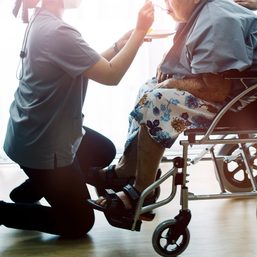SUMMARY
This is AI generated summarization, which may have errors. For context, always refer to the full article.

MANILA, Philippines – Around 40,000 Filipino nurses are employed by the United Kingdom’s National Health Service (NHS), comprising the third-largest nationality in the NHS. But working in the UK healthcare system has been difficult for many nurses, particularly during the crucial period of the COVID-19 pandemic.
Some Filipino nurses have had to take on multiple patients at a time, monitor two instead of one, and were forced to manage their emotions to maintain their focus during their shifts.
While there were initiatives by hospitals to support the nurses, such as consultations with psychologists and recreational activities, many of them felt that their compensation was not commensurate with the work they did.
Celeste Bess Sia has been a nurse in the UK for six years. In the last two years, at a private hospital in London, but before that, she worked at an NHS hospital north of London.
“I left because I got so tired during the pandemic,” Celeste said in an interview with Rappler.
A native of Zamboanga, Celeste initially gained experience from a provincial hospital, where she received P5,000 a month for two years. After that, she worked for four years in a hospital in Metro Manila.
“I wanted to gain enough experience first. By the time I applied for the UK, I had confidence in my experience and that I had a strong foundation. I felt ready and equipped to work abroad,” Celeste said.
Nikki Ordinario of Pangasinan arrived in the UK in March 2020, barely making it before Manila was locked down. Her first job was as a volunteer nurse in a local hospital, meaning she was paid absolutely nothing. After a year, she was hired as a substitute nurse.
“Some hospitals take advantage of new registered nurses, they charge for you to work for them as part of their volunteering program,” she said.
Then, she signed up for a two-year stint at a hospital in Saudi Arabia to bulk up her savings toward her ultimate goal: to work in the UK.
Despite restrictive conditions, she extended her stay for another year.
“It took a while before I saved enough because I had to contribute to the household expenses in the Philippines. I supported the education of my two younger sisters,” Nikki said.
Pandemic frictions
Anxiety and exhaustion ruled the days of the pandemic, reaching a peak in mid-2020, even beyond each 12-hour shift.
Mae Cabanit had been working at the Intensive Therapy Unit (ITU) for two years when COVID-19 patients started being admitted to her London hospital.
At first, she said, though they were provided with PPEs, they were limited. She recalled how, in her native Cebu, she wore recycled PPEs, and steeled herself: “‘You’ve been through worse!’ I was prepared for this because of what I went through in the Philippines.”
But at its peak in April 2020, she had to monitor two instead of just one patient, and during shift breaks, she couldn’t drink a lot of water. “Because then, you would need to go to the toilet, and you cannot go when you’re wearing your PPE! I was super tired, overworked, dehydrated.”
She confessed it was the worst time in her career because, not only were so many people dying, they were dying alone. The virus did not discriminate.
In 2020, there were 73,766 deaths due to COVID-19 in England and Wales. Yet, she took extra shifts during this time to preoccupy herself with work instead of worrying about her family in the Philippines.
“At work, I had to manage my emotions. I could not break down during my shift because I had to focus on so many things that needed to be done. When I got home, I cried so I could release all my emotions, all the stress,” she said.
Her hospital made available a psychologist for consultations at any time, recreational activities, and reclining chairs where they could take naps during breaks. Some companies sent help in kind: food, skincare, and couches.
Linda (not her real name), an endoscopy nurse in a hospital in East England, was redeployed to the ITU as more COVID-19-infected patients were admitted.
As more of them filled the ward in May 2020, Linda reflected on how, instead of taking care of family, she was taking care of other people in the UK.
But then she remembered the low pay back home. “If the salary of a nurse would reach P40,000 [a month] in the Philippines, I would never have considered finding a job abroad,” she said.
During the same period, Celeste had to care for four to five patients, all of them intubated.
She was tired and stressed, at what she viewed as the hospital management’s knee-jerk reactions to COVID-19.
The turning point was after, at her hospital at least, doctors passed on the task of turning off the breathing machines to ITU nurses.
“It was so traumatic that I would dream about it. I knew that I needed a break,” she said.
So, she applied for work at a private hospital.
After Nikki arrived at her NHS-provided accommodation in Oxford, save for a few times a week, she stayed put because the hospital management did not have policies in place related to the pandemic.
Instead of undergoing the customary three-month training and subsequent taking of the Objective Structured Clinical Examinations (OSCE) – the final requirement to be a licensed nurse in the UK – she had to shadow fellow nurses and attend review classes online, as the OSCE was suspended. She was able to take it after eight months.
During the pandemic, the British public made it a habit to clap for healthcare workers every Thursday to show their appreciation. But eventually, memes started coming out referencing how applause could not be used to buy groceries.
“Generally, in many countries, healthcare workers are not paid commensurate with what we do,” Nikki said. “It made us feel bad because, as we saw during the pandemic, we are your first line of defense, but our salaries are very low. Many nurses died during that time, and they were not compensated. And what about their families who were depending on them?”
But aside from risks of infection, recent studies of the NHS have shown that microaggressions and racism within hospitals were even starker during the pandemic.
Prejudice
Nikki feels the prejudice that some British doctors have against Filipinos in particular. She said fellow nurses advised her to let them be and focus on working for the welfare of their patients.
“Nararamdaman mo lang na inis sila sa iyo. Masungit lang sa mga Pilipino (You just feel that they are irritated with you. They are curt with Filipinos),” she said.
But otherwise, she added, they are generally polite.
Mae says, at the peak of the pandemic, when she would ride the London tube, even with a face mask on, some would look at her and say, “Go back to China!”
At work, there were patients or family members who, after seeing her, would request an English nurse. She just brushed these off. She has learned to not take it too personally.
Currently, through their union, the Royal College of Nursing, NHS nurses are in negotiations with the UK government after holding several strikes from December 2022 until February 2023.
Plans for the future
Nikki said that living expenses, especially the cost of rent, utility bills, and food are rising. She and her accountant-husband earn barely enough to cover them, plus they have to send money back home. As of February 2023, the UK’s annual inflation rate is at 10.4%.
According to Nikki and Celeste, the UK pays nurses lower salaries than the US, Australia, and Canada.
Before the pandemic, Celeste and her husband, who is also a nurse, were planning to move to Sydney, Australia, after obtaining British passports. However, they have since decided that for the foreseeable future, they are staying put in the UK.
“We have established ourselves here and have gotten used to the way of life. It will be difficult to start over again in another country. Work-life balance is very good here. They put so much value on break times and break from work,” Celeste said.
Although she is taking an ITU course sponsored by the hospital, she makes sure to rest on her days off.
For Nikki, the thought of more overt racism and violence in the US makes the situation in the UK better because “we feel safe here and the crime rate is low.”
Nikki said they are comfortable with where they are now. They are saving to purchase property in the UK.
Her younger sister now works as a nurse and lives close to her, and they share the expenses of their youngest sister who is finishing college in Baguio. – Rappler.com
(Check out this comprehensive guide for nurses seeking to work in the UK).
Mari-An Santos is an Aries Rufo Journalism fellow.
Add a comment
How does this make you feel?

![[Free to Disagree] Sabwatan ng mga doktor at drug companies](https://www.rappler.com/tachyon/2024/04/tl-sabwatan-doktor-drug-companies-April-22-2024.jpg?resize=257%2C257&crop=292px%2C0px%2C720px%2C720px)








There are no comments yet. Add your comment to start the conversation.